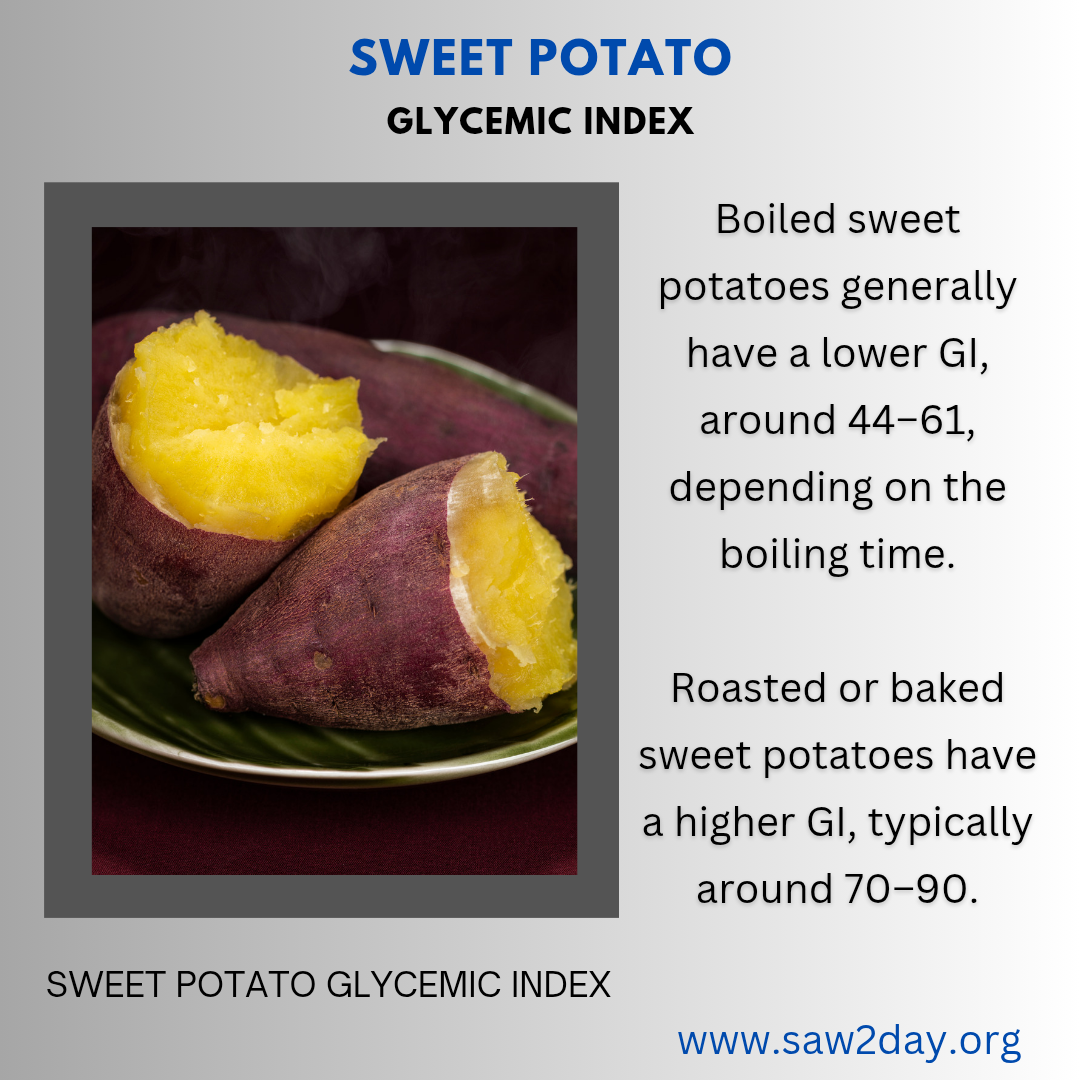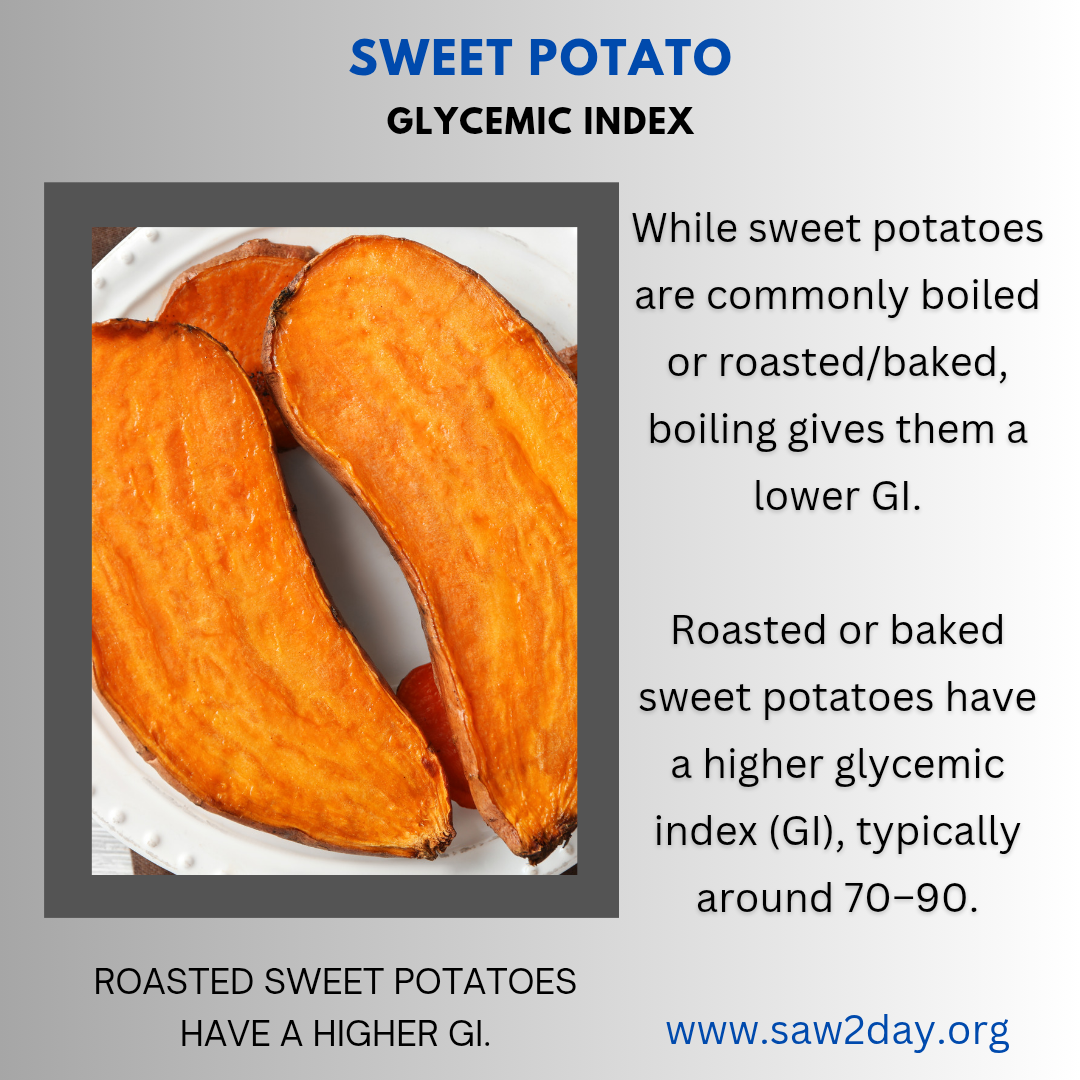Sweet Potatoes And Sugar Levels
The effect of sweet potatoes on blood sugar depends on how they are cooked. Roasting or boiling can impact their glycemic index, with different cooking methods leading to varying effects on blood sugar levels.
NUTRIENTS AND HEALTH BENEFITS
Sweet potatoes are packed with nutrients and offer several health benefits. While we list the goodness sweet potato below, please read this entire report before, eating them.
- Rich in Nutrients – High in fiber, vitamins (especially vitamin A, C, and B6), and minerals like potassium and manganese.
- Supports Eye Health – Loaded with beta-carotene, which converts to vitamin A and helps maintain good vision.
- Regulates Blood Sugar – Despite their natural sweetness, their fiber content helps slow sugar absorption, especially when boiled.
- Boosts Immunity – High in antioxidants, particularly in orange and purple varieties, which help fight free radicals.
- Promotes Gut Health – The fiber and resistant starch support good digestion and healthy gut bacteria.
- Heart-Friendly – Contains potassium, which helps regulate blood pressure, and fiber that supports heart health.
- Supports Brain Function – Antioxidants in sweet potatoes may help improve memory and reduce inflammation in the brain.


SUGAR IN SWEETPOTATOES GI
The sugar content in sweet potatoes is an important factor to understand, especially for diabetics and those monitoring their sugar intake. The way sweet potatoes are cooked affects their glycemic index, influencing their impact on blood sugar levels.
The glycemic index (GI) of sweet potatoes varies based on how they are cooked:
Boiled Sweet Potato (Low to Medium GI: 44–61) – Boiling retains more resistant starch, slowing down sugar absorption and leading to a lower GI.
Baked/Roasted Sweet Potato (High GI: 70–90) – Baking or roasting breaks down starches into simpler sugars, increasing the GI and causing a faster spike in blood sugar.
For diabetics or those watching blood sugar, boiling sweet potatoes is a better option as it has a lower impact on glucose levels.
GLYCEMIC INDEX (GI) MEANING
We talked about GI (Glycemic Index) a couple of times in this report. All foods have a Glycemic Index, this number is even more important for diabetics. Saw2day will try to explain the meaning of GI, without getting too technical.
The Glycemic Index (GI) is a scale that ranks carbohydrate-containing foods based on how quickly they raise blood sugar levels after consumption. The scale ranges from 0 to 100, with higher values indicating faster digestion and absorption, leading to a rapid spike in blood glucose.
GI Categories
Low GI (≤55): Slow digestion, gradual rise in blood sugar (e.g., lentils, nuts, whole grains). In an ideal situation Low GI foods is what diabetics should be looking for. Just making it clear that, qualified medical experts should decide the amount and type of food that should be consumed by diabetics.
Medium GI (56–69): Moderate impact on blood sugar (e.g., brown rice, sweet potatoes). We mentioned above that boiled sweet potatoes, would be in the 44 to 61 GI range. This is in the Low to Medium GI food groups.
High GI (≥70): Rapid rise in blood sugar (e.g., white bread, sugary cereals, white rice). With referenced to roasted or baked sweet potatoes, they would have a Glycemic Index of 70 to 90, which is definitely in the high GI category.
GI And Diabetics
Before we get into details it is important to understand that, diabetics need medical advice on food consumption, there is no substitute for medical attention. While Low GI food might seem ‘safe’ for diabetics, there should be a diet plan on what and how much to consume.
For diabetics, maintaining stable blood sugar levels is crucial. Foods with a low GI help in:
- Better blood sugar control – Prevents sudden spikes and crashes.
- Improved insulin sensitivity – Reduces the demand for insulin.
- Satiety and weight management – Keeps hunger in check, reducing overeating.
- Lower risk of diabetes complications – Helps manage long-term health risks.
SUMMARY
Whether it's sweet potatoes or any other food, moderation is always key to maintaining a balanced and healthy diet. For diabetics or individuals following a diet recommended by a health expert, Saw2day advises consulting a medical professional before deciding if, when, and how much sweet potato to consume. The cooking method for sweet potatoes, is also an important factor to discuss with a healthcare provider.
